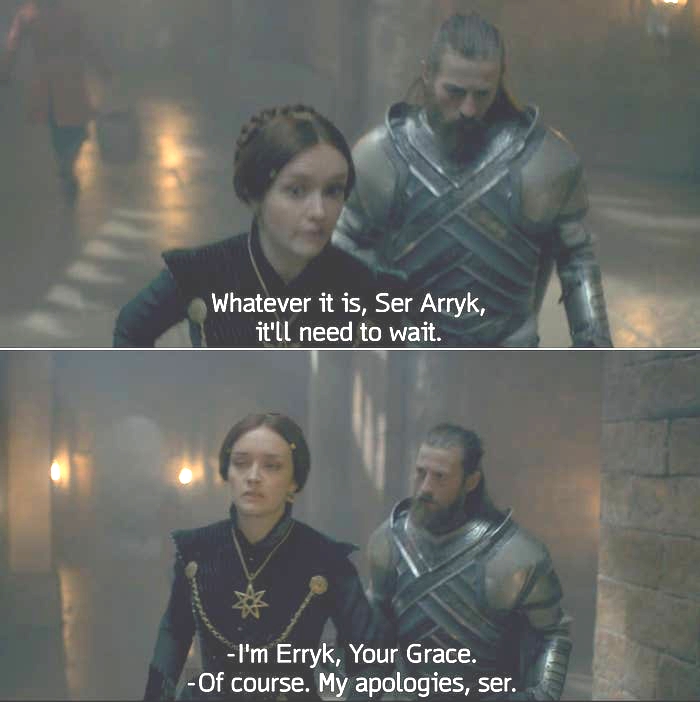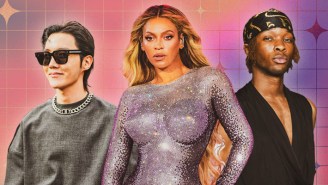House of the Dragon is many things, but at its core, it’s a soap opera. Like Marie Kondo, its writers simply love mess. And nowhere is that more evident than in the names it’s bestowed on some of the series’ most important characters.
It’s one thing for royals to have select titles carry through generations, bequeathing them to monarchs when they eventually ascend their thrones. After all, writer George R.R. Martin has based much of his writing within the Song of Ice And Fire universe on the very real histories of England – from its Dark Ages to the War of the Roses – and if there’s one thing the Brits liked back in those days, it was the name Henry. Or Edward. Or Richard. Or Charles…
The point is, there’s precedent for this perverse repetition of phonetic mayhem so some of the blame must be laid at Martin’s – and by extension, all of Great Britain’s – feet.
But the rest? The rest is all showrunner Ryan Condal who, when told he’d need to change a Viserys or two for fans to follow along more easily in this Civil War tearing House Targaryen apart, said (and we quote) “I think the f*ck not.”
And that is the exact moment House of the Dragon chose narrative violence.
Episode after episode this nom de guerre free-for-all pushed fans to the brink of insanity. Sure, HOTD is based on Martin’s writings, but this is television, people! And television people cannot, in good conscience, be expected to delineate between multiple white-haired tyrants based solely on if their name ends in a “ys” or a “yra.” We are watching tiny screens for entertainment, not prepping for Westeros’ version of the Scripps National Spelling Bee! We’re trying to see if a prestige cable drama will let an uncle f*ck his niece and call it romance – spoiler, it will – not dragging ourselves through an onomastic labyrinth of Targaryen etymology for fun. And yet, after an entire season, here we stand.
Two Viserys-es. Three Aegons. A Daemon, an Aemond, and a Vaemond. A Rhaenyra, a Rhaenys, a Rhaena. A Baela. A Helaena. A Laena. A Lucerys, a Jaecaerys, a Jaehaerys, and a Jaehaera.
We’ve got errant “a’s” before “e’s.” We’ve got “n’s” confusing Velaryon and Targaryen lineage. We’ve got anagrams sneakily serving as metaphors for one-eyed nephews perversely obsessed with their hot, older uncles. We’ve got kings sharing names with princes, a would-be queen splitting prefixes with the queen-that-never-was. We’ve got an entirely nonsensical number of children whose names start with the letter “j.” (Four. Four names. The writers are just goofing at this point.)
And we haven’t even touched on the fictional anarchy these dynastic denominations have wreaked.
As Our Lady Of Millennial Trauma Taylor Swift once crooned, “Sometimes I feel like everybody is a sexy baby.” Now, sub in the name Aegon Targaryen for “sexy baby” and you’ve landed on the crux of the succession problem brewing on House of the Dragon. In its penultimate episode, too many Aegons in the metaphorical kitchen led a dim-witted Alicent Hightower to believe her son – a lecherous pervert with no real ambition to rule – was the hero her dying husband imagined would one day reunite the realm. In truth, Viserys was translating Aegon the Conqueror’s dream and doing a bad job of it. Had he lived just one more day, perhaps Viserys could’ve corrected this mistake, but his death gave Alicent and the Hightower allies the opportunity they were hoping for to usurp the throne – and the unimaginative naming conventions of House Targaryen made it all too easy to conjure a believable reason why.
Irony. A plot device as old as incest itself. And it’s a clever one for a show that constantly flirts with anti-monarchist themes and investigates designations of power – who’s worthy to rule and why. To have the downfall of Westeros’ most influential family sparked by something as banal and trivial as a name mix-up is so tongue-in-cheek it’s practically lewd. And, for a second, as geriatric lords were being murdered via paperweights, HOTD almost had us fooled that cloning character names was a cerebral narrative trick we were just too dumb to notice. Perhaps three Aegons was high art? Maybe migrating the “d” in Daemon to the end of Aemond’s name was a nightmarish exercise in surrealism that was meant to feel Kafkaesque?
And then, the twins arrived.
Again, in House of the Dragon’s penultimate episode, as the hunt for the usurping slob kebab barreled through the streets of Flea Bottom, two members of the King’s Guard had an important role to play. Both knights from House Cargyll, Ser Erryk and Ser Arryk were twin brothers, identical in both looks and phonemes. They had already been used for comedic effect earlier in the season when Alicent mistook Erryk for his brother Arryk and the good-natured knight corrected her with a serious, “I’m Erryk, Your Grace” as if the pronunciation of his name differed at all from that of his brother.

But, in episode nine, the brothers set out on a quest to return Aegon to the throne and we, as the audience, were given an equally difficult task: find a way to keep track of which Erryk is which Arryk.
The disrespect. The complete fracas. The mental hoops we as viewers were forced to jump through in order to distinguish two human beings who even Mother Nature, when posed the same challenge, threw up her hands and said “Not my problem,” before letting the system glitch gestate for nine months was simply galling. This was Emmy-winning writing, yes. But this was also mess. Glorious trash. A garbage heap so delicious, raccoons would go to war over it.
And so, we’ve reached the real point of our own rambling word salad.
House of the Dragon has done many things right, and a few things wrong, but contrary to the Twitter discourse — and the very real, very personal torture of having to “jump on a call” with your mother after each episode airs in order to remind her which Targaryen prince is cosplaying as a pirate and which is played by the actor who once gaslit her into “believing Prince Philip was hot” – the repetition of main character names falls in the former category.
Why? Because to go against one of the writing world’s most revered commandments by hinging the entire conflict of your multi-million dollar show on a moniker mix-up is John McClane-level ballsy, to the Yippee-ki-yay mother*cker degree. It’s man railing against the gods. It’s Karyn Kusama fans defiantly defending Jennifer’s Body as the feminist manifesto it is over a decade later. It’s a still-wet Picasso painting. That Elizabeth Olsen appearance on Hot Wings.
It’s the best kind of melodrama – frustrating, preposterous, bold, and unapologetic. It’s lawlessness but for the chaotic good. It is the very essence of what makes HOTD feel different from its predecessor, focusing on the minutia of life, the triviality of destiny, and exploiting the fractured family dynamics so eye-rolling in their pettiness and perpetuity that you’d expect to find them on daytime TV, not a prestige streaming platform. It is high art, forming a combustible mix with the lowest of pop culture gratification. It’s a linguistic mascot for masochism.
Please, HOTD, give us more Aegons. We deserve it.
HBO’s ‘House of the Dragon’ airs on Sunday nights.







